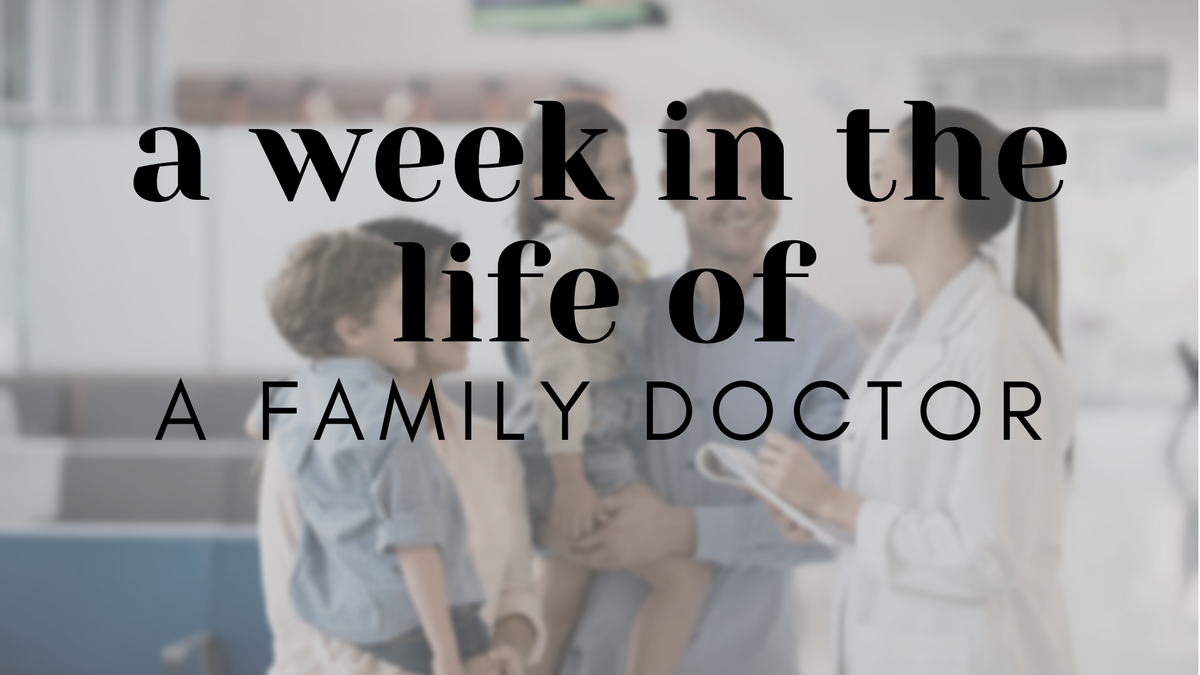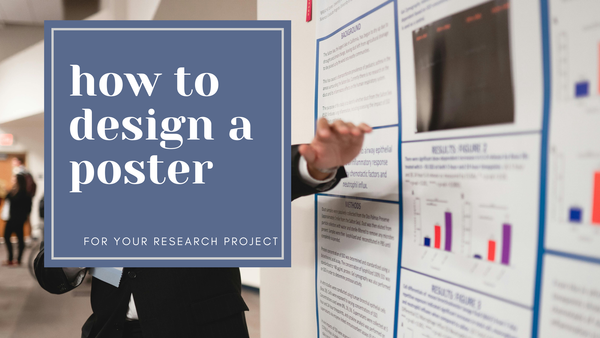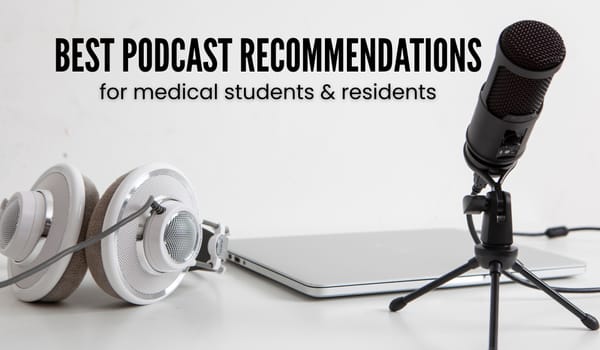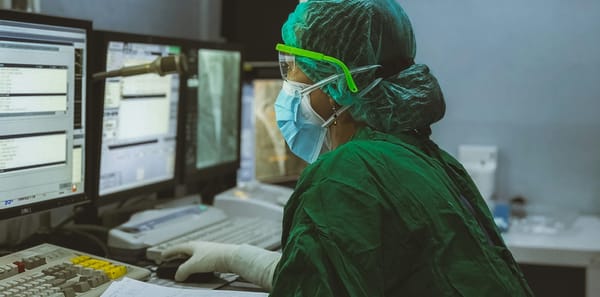Week in the Life of a Family Medicine Doctor
As part of our final year of medical school, we have a required practice in family medicine:…

As part of our final year of medical school, we have a required practice in family medicine: for us, it was 1 week spent one-on-one with a doctor that they assign you to. This blog post is merely a collection of my observations as a medical student spending a single week in a family doctor in the suburbs of my capital city, and some of the things I learned along the way.
[Note: I’m a 6th year medical student in Europe and these are purely my observations after only 5 working days; please correct me if I’m wrong on any front!]
GP vs. Family Doctor vs. PCP?
The truth is, I don’t know what the differences are, and a quick Google search made me none the wiser. I will be using family doctor and GP (general practitioner) interchangeably until I figure out what the difference between them are (if you know, do let me know below!). PCP, which stands for primary care physician, is perhaps a broader term that encompasses all types of general medicine.
For the purposes of this article, a GP = FD: but what exactly does THAT mean? A family doctor is someone who is responsible for the patient in a holistic manner – they take appointments, they send their patients to specialists, and they follow the patient throughout their life.
In my country, a GP is assigned to a district (a geographical part of the city), and those patients ‘belong’ to the GP. They are entered into the database, and from that moment on, the doctor is the primary physician (aka the frontline worker) for this particular person (and often, family). There are some GPs who see children as well, but mine was only an adult medicine doctor.
GPs in my country hold office hours in such a manner:
Monday: 8-12pm
Tuesday: 4-8pm
Wednesday: 8-12pm
Thursday: 8-12pm
Friday: alternating between morning and afternoon office hours
Patients arrive during office hours with a variety of complaints, requests, doubts, needs and the doctor attempts to see them in 15 minute interval appointments (which is often challenging and goes much longer than the allotted 15 minutes). When there aren’t office hours, the doctors are usually swamped with paperwork, making house calls or working another job (because the salary of a GP might not be enough for a good living).
GP offices in my country are not private…nor are they really centralized. What this means is that the doctor sees patients who are covered by the national insurance (i.e. it’s free for them), and she has to get reimbursed from the state for these tasks. However, the GP is in charge of the office FULLY, which means: paying wages to the nurse, the cleaning lady, and themselves; stocking up on medication, supplies; ordering and maintaining equipment, devices, etc. and dealing with the everyday tasks of running one’s own business. It’s not easy.
I think I’m explaining this very poorly indeed, so let me instead demonstrate.
What are some of the tasks of a GP?
I spent a week with my GP and these are some of the general tasks that she and her assistant/nurse do on a daily basis:
(all while appointments were arriving, the phone was ringing constantly (tele-medicine was in full force due to coronavirus) and the emails kept coming in)
- patient education: perhaps the single most important (and arguably hardest) job of a GP: to teach their patients to stop doing the things that harm them (smoking, drinking, high blood pressure, poor glucose control)
- many an appointment was dedicated to talking to patients about why they need to stop, how they can do it, and planning next steps
- patient advocacy: not all doctors are good (the sad truth), and so the doctor makes calls and advocates for her patients if she felt like they weren’t getting the care required
- medicine reconciliation: it can happen that specialists prescribe medication without knowing the full history of the patient, and the doctor ALWAYS looks through the complete list of meds to make sure that none are interacting poorly
- tasked with giving prescriptions for meds that ran out – this is a huge task, lots of paperwork, lots of patients needing last minute prescriptions filled, phone always ringing off the hook
- differentiating between the acute (uh oh, go to the ER) and benign: a GP has very limited equipment and has to make calls based on their years’ of experience and their knowledge/basic examination skills – they have to decide whether it’s a simple cold or a bacterial infection, whether it’s a simple gastroenteritis or a disease requiring hospitalization – and it’s not always black and white
- emotional support: a lot of patients have to be counseled, reassured, supported, and made to feel heard
- sick leave paperwork: got a cold and can’t make it to work? lot’s of paperwork had to be done
- annual screening/regular checkups: lots of asymptomatic diseases can be better treated if caught early, but most people don’t go to the doctor when they feel fine – my GP kept her eye on her patients, encouraging them to do regular checkups as needed
- ordering lab work, calling them back to discuss any abnormalities, associated lifestyle changes, next steps, and reordering them to check if any improvements can be seen
- in family medicine, patient confidentiality (at least in my country) can be a little blurred – you’re often not just treating one person, but a whole family, so you get a lot of, “Hey, how has your mother been, it’s time for her to come in for her annual _____!”
- house calls: strange as it seemed to me, docs in my country still make house calls! This is generally for patients who can’t leave the house (disability, severe fatigue or illness, etc.); I didn’t get to go on house calls with the doctor sadly, but I would have been very curious as to what it’s like
- they also do house calls ‘of convenience’ – patients who don’t want to take the time to make an appointment, wait in the waiting room, etc. can pay a small fee (~15 dollars) to make an appointment for themselves at home
- …and so so much more…
My Thoughts on Family Medicine
My week in family medicine was really eye-opening. I went into it wanting to learn, take away what I could, even knowing I wasn’t going into FM as a field, and it was really beneficial.
It frustrates me when people speak poorly about family med (and that happens a lot around me, I’m not sure if it’s a widespread belief). It’s not viewed as a particularly glamorous field, and many people think it’s boring or easy.
Let me start by saying that FM is far from easy – what little I’ve seen this week has shown me that a good GP has to have an enormous amount of widespread knowledge, including little tidbits from the specialties – it’s not a simple matter of referring everyone to a specialist. There are many things a GP can treat or manage, even before a specialist gets involved. They have to know medications well: their effects and side effects, their indications and contraindications, their interactions – and they have to constantly view and review them, as meds are dynamic and often adjusted at each hospital visit.
GPs are true frontline workers. In many cases, patients trust them and will go to their GP (or call them) with even acute problems. A GP can catch diseases in the early stages, yes, but they can also make life-saving calls.
A family doctor who has been treating someone for decades comes to know their patients intimately: their weaknesses, their fears, their tendencies. The lady who constantly calls with a variety of symptoms is less likely to have a life-threatening disease (and doesn’t need to go to the ER), because she does this weekly. This saves the patient from wasting time & energy, and saves the system from unnecessary tests/examinations. (And yes, in a perfect world the patient would seek some psychiatric help, but sadly that is not the case.)
But you also get to know your patients as humans, not just cases on an assembly line. You counseled a patient through their first pregnancy and inquire about the child at each visit; families send you postcards and little gifts (homegrown peaches, apples, etc.) and bring coffee (they know what you drink). Your patients are people you might live next to or have watched grow up, and it might be especially challenging when they become ill or even die.
Office hours – yes, you have designated office hours – but your patients know you and your nurse colleague: they know where you live, they sometimes have your phone number, your email address, and they seek you out off-hours all the time. Trust me, it is not easy.
Remember what I said about frontline workers? They don’t turn patients who belong to the practice away – and there is nothing (and no one) between you and the patient. Patients can often get agitated, frustrated or downright angry and it’s scary. I think that being a GP is actually really brave, and I have the utmost respect for the doctor who can stand their ground (and not grant sick leave when it isn’t due, for example) even in the face of threatened violence.
Disease prevention is one of the MOST important parts of medicine – all fields of medicine, don’t get me wrong – but in the primary care part especially. As I mentioned before, so many of the diseases that ail us today are actually preventable, or if it’s too late, well-manageable… and yet we’ve got people with their 16 mmol/L fasting glucoses and their 200/100 blood presssures. I would find it so difficult to not be exasperated… but my GP never wavered. She kept going – explaining, over and over and over again, the importance of healthy diet, exercise, no smoking, etc. and it was so admirable. I think you need a demeanor of steel to try again, even in the face of repeated ‘failures’ to get through to patients.
[It was especially touching when the patient came in and said, “Doc, I haven’t smoked a cigarette in 10 days,” and his face was actually beaming with pride.]
Running a practice – it’s not a private practice, but it’s self-owned and maintained, and that is hard. You’re in charge of everything that goes into building up a practice, and it’s up to you to make sure the printer paper is stocked, the hand soap is full, the meds aren’t expired.
That being said, you get to be your own boss. No one to tell you what to do (or not do): you make the rules, you set your hours, you rule the land.
Final Words
I’m not saying you can’t find family medicine boring – I completely understand that the field isn’t for you, and your soul isn’t ignited by the prospect of the above-mentioned.
But I do recommend that, if given a chance to learn alongside a family doctor, try to do exactly that. It’s not an easy field, and there are so many little intricacies. And so much to learn. Even if you want to be a surgeon. Or a dermatologist. Or an ER doc. Patients are never just their diseases, and they generally don’t just have one disease, pertaining to your specific specialty. So it’s really important to learn medicine holistically, and learn from EVERY angle you can.
And for those who thought family medicine was an easy profession – I hope that now, knowing what goes into family medicine, you don’t feel that way anymore.




